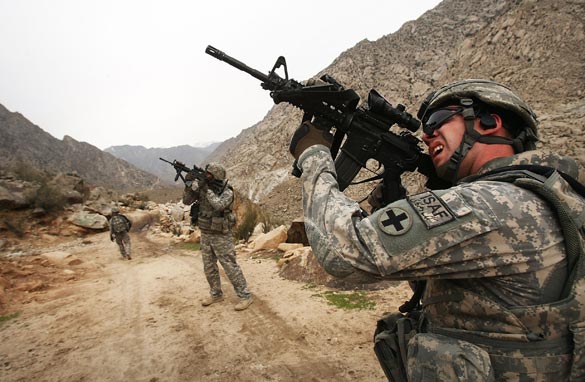Afghanistan: The Perils of Our Lack of Knowledge (Lieven)
 Reviewing three recent books on Afghanistan for the magazine Current Intelligence, Anatoly Lieven offers an analysis of why the US-led intervention in the country is often misguided and counter-productive:
Reviewing three recent books on Afghanistan for the magazine Current Intelligence, Anatoly Lieven offers an analysis of why the US-led intervention in the country is often misguided and counter-productive:
If books like the ones under review had appeared in 2002, and been read by Western commanders and officials, they might have changed the course of the Afghan War. Even today, should a US administration ever be able to disentangle itself from the Karzai government and nerve itself to open serious negotiations with the Taliban, such works will be indispensable to understanding the people on the other side of the table.
Antonio Giustozzi’s edited volume Decoding the New Taliban: Insights from the Afghan Field is a superb collection of essays by leading researchers, among them Gretchen Peters on the Taliban’s taxing of the opium trade, Thomas Ruttig on the Haqqani network, and Claudio Franco on the Pakistani Taliban. Empires of Mud: Wars and Warlords in Afghanistan
, on the other hand, is Giustozzi’s own study of what has been in effect --- God help us --- “our” side in Afghanistan: the regional and local commanders whose rule the Taliban overthrew after 1994, and whom the US brought back to power in 2001 under the façade of democracy.
My Life With the Taliban is the memoir of Mullah Abdul Salam Zaeef, edited by two Kandahar-based western journalists, Alex Strick van Linschoten and Felix Kuehn....Zaeef was a member of the Taliban since its founding elements first came together in Kandahar in the early 1980s to fight the Soviets and Communists. Under Taliban rule he was a minister and finally ambassador to Pakistan, before being imprisoned at Guantanamo and elsewhere between 2002 and 2005. He has now made his peace with the Karzai administration, and in his book criticises aspects of Mullah Omar’s leadership; but he undoubtedly remains close to the Taliban in sentiment, and above all absolutely detests the US presence in Afghanistan.
But the people who shaped Western policy in the first crucial years after the overthrow of the Taliban did not have these books available to them, and knew precious little about Afghanistan. Thus despite the British Empire’s long and bitter history on the Afghan frontier, the British government and military in 2007 were totally unaware of how their military presence in Afghanistan would look to ordinary Pashtuns. As Mullah Zaeef writes (and as British journalists say is a close reflection of Pashtun views in Kandahar and Helmand):
Another strategic mistake [by the US] was to allow the British to return to the south, or Afghanistan in general. The British Empire had fought three wars with Afghanistan, and their main battles were with the Pashtun tribes in southern Afghanistan. They were responsible for the split of the tribal lands, establishing the Durand Line. Whatever the reality might be, British troops in southern Afghanistan, in particular in Helmand, will be measured not only on their current actions but by the history they have, the battles that were fought in the past. The local population has not forgotten, and many believe, neither have the British. Many villages that see heavy fighting and casualties today are the same that did so some ninety years ago…The biggest mistake of American policy makers so far might be their profound lack of understanding of their enemy.
The notion that the British army is in Afghanistan to seek revenge for 19th century defeats is of course absolutely grotesque, but that is not the point. The point is that ordinary Afghans do indeed believe this – and the British security establishment ought to have known that they would. That we did not know this is a shattering illustration of the fact that while British policy is in the end powered by sublimated imperial nostalgia, most of the really valuable practical memories and lessons of empire have long since been forgotten.
The Ghastly Masquerade
The battlefields of Afghanistan are real enough, God knows, for the poor devils who fight and die there; but as so many fatuous statements about Afghanistan suggest, for great sections of Western government, politics, media and public opinion engagement in Afghanistan has been above all one of the largest and most expensive exercises in collective narcissism that the world has ever known, and Afghanistan itself a landscape of the mind, onto which Westerners could project a variety of agendas and fantasies. As Antonio Giustozzi writes, “Every age has its follies; perhaps the folly of our age could be defined as an unmatched ambition to change the world, without even bothering to study it in detail and understand it first.”
It would be nice to pin all the blame for this on Bush, Blair and their supporters, but this tendency spread much more widely and is much more deeply rooted in contemporary Western culture. An enormous range of groups and interests jumped onboard the US intervention in Afghanistan. In the first years after 2001, literally thousands of government departments and contractors, but also high-minded NGOs swarmed around the bloated feast of Western “aid to Afghanistan” – I would say like hagfish or hyenas, but at least those useful scavengers have the grace not to proclaim their righteousness and generosity to the heavens in between mouthfuls. The result has been to entangle Western discussion of Afghanistan in great webs of deceit and self-deceit....

 Sunday, September 12, 2010 at 10:07
Sunday, September 12, 2010 at 10:07
Reader Comments